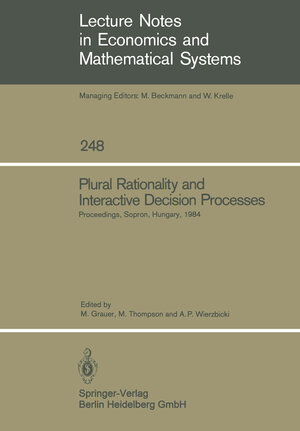
×
![Buchcover ISBN 9783662024324]()
Plural Rationality and Interactive Decision Processes
Proceedings of an IIASA (International Institute for Applied Systems Analysis) Summer Study on Plural Rationality and Interactive Decision Processes Held at Sopron, Hungary, August 16–26, 1984
herausgegeben von Manfred Grauer, Michael Thompson und Andrzej P. WierzbickiThese Proceedings report the scientific results of the Summer Study on Plural Rationality and Interactive Decision Processes orga nized jointly by the System and Decision Sciences Program of the Inter national Institute for Applied Systems Analysis (located in Laxenburg, Austria) and the Hungarian Committee for Applied Systems Analysis. The Study, which was held in Sopron over the period 16-26 Augus·t 1984, had a very special character. Sixty-eight researchers from sixteen coun tr~es participated, most of them contributing papers or experiments. In addition many members of IIASA's Young Scientists Summer Program were present. All of these participants were heavily involved in dis cussions; discussions that were not limited to the allotted time but extended well into the evenings and nights. By design, the Study gathered specialists from many disciplines, from philosophy and cultur al anthropology, through decision theory, game theory and economics, to engineering and applied mathematics. A further element of diversity was the representation of several varieties of culture, from typically Western countries, through Middle and Eastern Europe, to the Far East.



